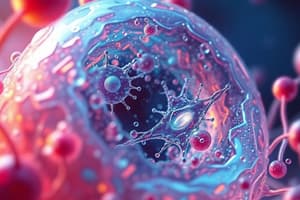Podcast
Questions and Answers
What does cell theory emphasize about living organisms?
What does cell theory emphasize about living organisms?
- The unity underlying the diversity of forms. (correct)
- The simplicity of cellular organisation.
- The individual characteristics of organisms.
- The diversity of all life forms.
What is the primary focus of the physico-chemical approach in biology?
What is the primary focus of the physico-chemical approach in biology?
- Analyzing genetic sequences.
- Examining physical structures of organisms.
- Describing processes in molecular terms. (correct)
- Studying the behavior of organisms in their environment.
Which aspect of biology does 'Reductionist Biology' primarily apply?
Which aspect of biology does 'Reductionist Biology' primarily apply?
- Observing behavioral patterns in natural habitats.
- The concepts and techniques of physics and chemistry. (correct)
- Ecological interactions among species.
- The complex relationships in ecosystems.
How can the molecular basis of physiological processes be investigated?
How can the molecular basis of physiological processes be investigated?
What is one outcome of studying cell structure and growth by division?
What is one outcome of studying cell structure and growth by division?
What kind of compounds are typically analyzed in living organisms to understand cellular processes?
What kind of compounds are typically analyzed in living organisms to understand cellular processes?
Which physiological processes can be addressed through studying biomolecules?
Which physiological processes can be addressed through studying biomolecules?
What aspect of living organisms remains mysterious according to cell theory?
What aspect of living organisms remains mysterious according to cell theory?
What significant structure did Ramachandran discover in 1954?
What significant structure did Ramachandran discover in 1954?
Which plot did Ramachandran develop to analyze protein conformations?
Which plot did Ramachandran develop to analyze protein conformations?
Who first observed and described a live cell?
Who first observed and described a live cell?
Which component of the cell did Robert Brown discover?
Which component of the cell did Robert Brown discover?
Which statement about unicellular organisms is true?
Which statement about unicellular organisms is true?
What did Matthias Schleiden conclude about plant cells?
What did Matthias Schleiden conclude about plant cells?
What is the fundamental structural and functional unit of all living organisms?
What is the fundamental structural and functional unit of all living organisms?
In which year did Matthias Schleiden propose his hypothesis about cells?
In which year did Matthias Schleiden propose his hypothesis about cells?
What does the presence of a cell wall characterize?
What does the presence of a cell wall characterize?
Which scientist was influential to Ramachandran during his studies at Cambridge?
Which scientist was influential to Ramachandran during his studies at Cambridge?
Flashcards are hidden until you start studying
Study Notes
Overview of Biology and Cell Theory
- Biology studies living organisms, highlighting their diversity and cellular organization.
- Cell theory emphasizes the unity of life through cellular organization, serving as a foundation for understanding living phenomena.
- Investigating physiological and behavioral processes requires an understanding of cellular integrity.
Physico-Chemical Approach
- A physico-chemical approach employs cell-free systems to explore molecular processes in living organisms.
- Analysis of living tissues reveals the types of organic compounds present in cells.
- This approach addresses the function of these compounds in physiological processes like digestion, memory, and defense.
- The study focuses on understanding the molecular basis of normal and abnormal physiological processes, particularly during disease.
Reductionist Biology
- Reductionist Biology applies principles from physics and chemistry to understand biological systems.
- It seeks to explain biological processes at the molecular level, often utilizing techniques like the Ramachandran plot for protein structure analysis.
G.N. Ramachandran: Pioneer in Structural Biology
- Born on October 8, 1922, in India; influential in protein structure and conformational analysis.
- Established the 'Madras school' of conformational analysis and discovered collagen's triple helical structure in 1954.
- Developed the Ramachandran plot to analyze allowed protein conformations, contributing significantly to structural biology.
- Graduated from the University of Madras in 1942 and obtained a Ph.D. from Cambridge University in 1949.
- Influenced by Linus Pauling's research on protein structures during his time in Cambridge.
- Passed away on April 7, 2001, at age 78.
Understanding Cells
- Cells are the fundamental structural and functional units of all living organisms.
- Organisms can be unicellular (single-celled), capable of independent life, or multicellular (composed of many cells).
Historical Discoveries in Cell Biology
- Anton Von Leeuwenhoek first observed live cells.
- Robert Brown discovered the nucleus within cells.
- The invention and enhancement of the microscope, especially the electron microscope, have illuminated the structural details of cells.
Development of Cell Theory
- Matthias Schleiden (1838) studied plant cells, concluding all plants consist of various cells forming tissues.
- Theodore Schwann (1839) examined animal cells and noted the presence of a plasma membrane.
- Schwann proposed that both plants and animals are composed of cells and their products, laying the groundwork for the cell theory.
Studying That Suits You
Use AI to generate personalized quizzes and flashcards to suit your learning preferences.




